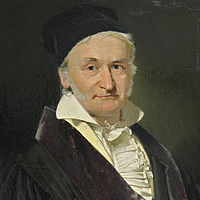Carl Friedrich Gauss
Johann Carl Friedrich Gauss was a German mathematician and physicist who made significant contributions to many fields in mathematics and science.
German mathematician, generally regarded as one of the greatest mathematicians of all time for his contributions to number theory, geometry, probability theory, geodesy, planetary astronomy, the theory of functions, and potential theory (including electromagnetism).
Gauss was the only child of poor parents. He was rare among mathematicians,retained the ability to do elaborate calculations in his head most of his life. Impressed by this ability and by his gift for languages, he was granted financial assistance to continue his education locally and then to study mathematics at the University of Göttingen. Gauss’s pioneering work gradually established him as the era’s preeminent mathematician, first in the German-speaking world and then farther. Gauss’s first significant discovery, was that a regular polygon of 17 sides can be constructed by ruler and compass alone. His doctoral thesis of 1797 gave a proof of the fundamental theorem of algebra: every polynomial equation with real or complex coefficients.. Gauss later gave three more proofs of this major result, Gauss worked for many years as an astronomer and published a major work on the computation of orbits.Gauss published works on number theory, the mathematical theory of map construction, and many other subjects. In the 1830s he became interested in terrestrial magnetism and invented magnetometer. After Gauss’s death in 1855, the discovery of so many novel ideas among his unpublished papers extended his influence well into the remainder of the century.

Carl Friedrich Gauss
Date of Birth: 30 Apr 1777
Birth Place: Brunswick, Germany
Proffession: German mathematician
Nationality: German
Death: 23 February 1855, Göttingen, Germany


